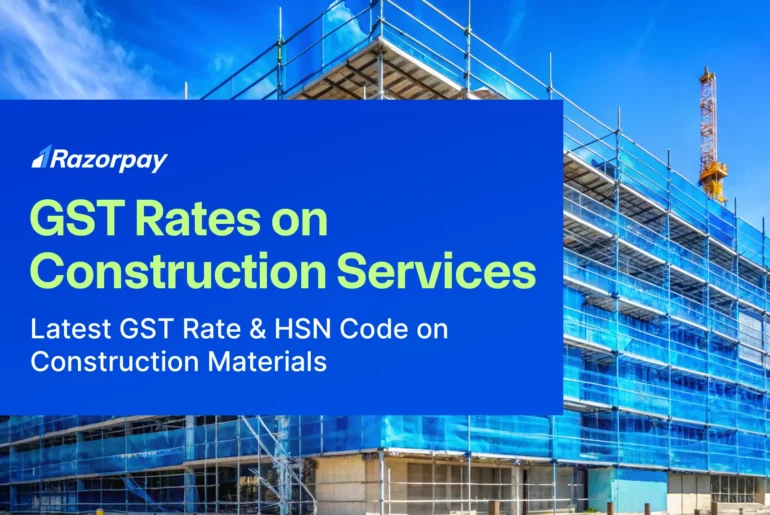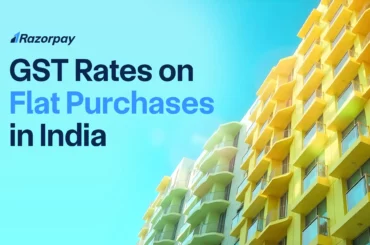Table of Contents
GST on Construction Services
GST Rate on Construction Services in 2025 with HSN Code
Below is a table summarizing the GST rates on construction services:
Types of Construction Services |
GST Rate |
HSN Code |
| Construction of residential complexes | 12% (after 1/3rd land deduction) | 9954 |
| Works contract for government, local authority, or governmental authority | 12% | 9954 |
| Affordable housing projects (w.e.f April 1, 2019) | 1% without ITC | 9954 |
| Construction of commercial complexes | 18% | 9954 |
| Completion and finishing services (e.g., painting, tiling) | 18% | 9954 |
| Composite supply of works contract (Value of goods is less than 25%) | 18% | 9954 |
| Composite supply of works contract (Value of goods is more than 25%) | 12% | 9954 |
| Construction services for highways, roads, railways, bridges, airport runways, and tunnels. | 18% | 995421 |
| Masonry services | 18% | 995456 |
Note: The GST rate on certain construction services is calculated after reducing 1/3rd of the total value towards the land component.
Related Read: GST on Maintenance Charges
GST on Construction Materials in 2025
The table below outlines the GST rates on construction materials:
Types of Construction Materials |
GST Rate |
| Sand | Natural Sand – 5%
Oil shale/bituminous, asphalt, asphaltic rocks, natural, tar sand, – 18% |
| Crushed Stones, Pebbles, Gravel | 5% |
| Building Stones | 5% |
| Coal | 5% |
| Brick | 5% – 28% |
| Tiles | 5% – 28% |
| Mica | 12% |
| Granite and Marble – Blocks | 12% |
| Granite and Marble – Not in Blocks | 28% |
| Steel and Iron | 18% |
| Oil Shale, Bituminous Rocks, Natural Asphalt, Tar Sand | 18% |
| Pipes and Tubes, Fittings | 18% |
| Cement | 28% |
| Wallpaper | 28% |
| Varnish and Paint | 28% |
| Electrical Appliances | 28% |
| Bathroom Interiors and Appliances | Pipes and tubes, fitting- 18%
Other items- 28% |
| Other Items | 28% |
Related Read: GST on Steel & Iron Bars, Scraps and Other Products in 2024
Factors That Affect GST Applicability on Construction Services
When it comes to GST on construction services, there’s no one-size-fits-all rule. The actual GST you pay — or need to charge — depends on several factors. Let’s break them down in a simple way:
Type of Construction
The kind of project really matters. Whether it’s a residential flat, a commercial shop, or even an industrial warehouse — the GST treatment can be totally different.
- Residential vs Commercial: The GST rate and conditions can change based on the type of construction. Residential projects (like affordable housing) might get concessions, while commercial or industrial ones usually have standard rates.
Nature of the Transaction
What kind of deal is happening here? GST rules vary based on the nature of the transaction:
- Sale: If you’re selling an under-construction property, GST definitely kicks in.
- Leasing or Renting: If the property is being constructed for rental or lease — especially for business use — then specific GST provisions may apply.
- Extra Services: Things like site preparation, finishing work, or interior services? These can also attract GST as additional/ancillary construction services.
Who’s Involved in the Transaction
Different roles in the construction chain also affect GST application:
- Buyers and Sellers: The buyer’s and seller’s status (whether they’re registered under GST or not) affects how GST is applied and who is liable to pay it.
- Contractors: The people actually doing the construction — builders, contractors — have to apply and pay GST on their work.
- Other Stakeholders: Think of agents, intermediaries, or even investors — they may also have specific responsibilities under GST law depending on their role.
In short, whether you’re buying, selling, building, or just leasing a property, GST rules change depending on what’s being built, how it’s being used, and who’s involved. So always double-check the GST treatment that fits your specific case.
GST Applicability on Construction Work in India
GST applies to various construction activities across India, including private, commercial, and residential projects. Specifically, GST is charged on under-construction properties intended for sale, as these are treated as a supply of services under the GST framework. However, completed properties with a completion certificate do not attract GST.
The GST on construction work depends on multiple factors, such as the type of construction, the nature of the transaction, and the status of the parties involved.
According to Schedule II, para (5b) of the CGST Act, the construction of a building, complex, or civil structure for sale is considered a supply of services, unless full consideration is received after the issuance of a completion certificate. In such cases, the property is exempt from GST.
GST Exemptions and Concessions
- Affordable Housing: A reduced GST rate of 1% is applicable to affordable housing projects. These are defined as residential properties with a carpet area of up to 60 square meters in metropolitan cities and up to 90 square meters in non-metropolitan cities, valued at Rs. 45 lakhs or less.
- Exemptions: GST is not applicable on property resales, transactions involving completed residential properties, and the buying or selling of land. Additionally, construction services or enhancements provided through pure labor contracts under the Pradhan Mantri Awas Yojana (PMAY) are exempt from GST.
- Pure Labor Contracts: GST is also exempt on construction services provided through pure labor contracts for a single residential unit or within a residential complex.
- e-Way Bills: The transportation of construction materials like cement and steel requires an e-Way bill only when the consignment value exceeds Rs. 50,000.
Construction service providers registered under GST are required to issue GST-compliant invoices for their services.
Related Read: GST on Labour Charges: Find Latest GST Rates on Labour Services in 2024
GST Calculation on Under-Construction Property with Example
When calculating GST on an under-construction property, it’s essential to consider both the service component (construction services) and the material component (construction materials).
1. Service Component
- The GST rate for construction services varies depending on the type of project.
- For most projects, the GST rate is 18%.
- However, affordable housing projects may benefit from a reduced rate of 1%.
Example:
If the agreement value of a property is ₹50 lakhs and falls under the general category with an 18% GST rate, the GST payable would be:
GST on Service Component = (Agreement Value * GST Rate) / 100
GST = (50,000,000 * 18) / 100 = ₹9,00,000
2. Material Component
- The GST rate for construction materials also depends on the specific items.
- Generally, construction materials are subject to an 18% GST rate.
Example:
If the construction materials amount to ₹10 lakhs, the GST payable would be:
GST on Material Component = (Material Cost * GST Rate) / 100
GST = (10,00,000 * 18) / 100 = ₹1,80,000
Total GST on the Property
To calculate the total GST on the property, you need to add the GST on the service component and the material component:
Total GST = GST on Service Component + GST on Material Component
In the above example, the total GST would be ₹9,00,000 + ₹1,80,000 = ₹10,80,000.
Note: This is a simplified example. The actual GST calculation may vary based on specific factors, such as the location of the property, any applicable exemptions, and the latest GST regulations. It’s recommended to consult with a tax professional for accurate calculations and guidance.
Availability of ITC on GST Paid for Construction Activities
Input Tax Credit (ITC) is available for most construction-related expenses. However, specific restrictions apply:
1. Non-availability of ITC
As per Section 17(5), clauses (c) and (d) of the CGST Act, ITC is not available for the construction of immovable property unless the property is used for further taxable supply of works contract service or plant and machinery. ITC cannot be claimed in the case of renovation or repair of the property.
2. Eligibility
Construction companies, builders, and promoters can claim ITC on the GST paid for construction activities, provided the input services or goods are used in the course of business.
Common Challenges in GST for the Construction Sector
Despite the simplification brought by GST, the construction sector still faces several challenges:
1. Compliance
Understanding and complying with GST requirements can be challenging, especially for small and medium-sized contractors.
2. Cash Flow Issues
The need to pay GST on an accrual basis, even before receiving payment from clients, can lead to cash flow problems.
3. Classification and Rates
Determining the correct classification and applicable GST rates for different construction activities and materials can be confusing, leading to potential disputes with tax authorities.
These challenges highlight the importance of proper tax planning and compliance management for businesses in the construction sector.
Note: It’s important to note that these rates may vary depending on specific factors and any updates to GST regulations. For the most accurate and up-to-date information, it’s recommended to consult with a tax professional or refer to official government guidelines.
Related Read: GST on Bricks in 2024 – Latest Rates, HSN Codes, & Key Changes
Related Read: A Guide to GST on Flat Purchases
Conclusion
Navigating GST in the construction sector can be complex, but understanding the rates, exemptions, and compliance requirements can make things a lot smoother. Whether you’re a builder, contractor, or buyer, it’s important to know how GST applies to your specific project — be it residential, commercial, or infrastructure. With changing rates and evolving rules, staying updated and seeking professional advice can help you avoid pitfalls and manage costs more effectively.
Frequently Asked Questions (FAQs)
1. What is the current GST rate on construction services?
The current GST rate on most construction services is 18%, but it can be lower (e.g., 1% for affordable housing).
2. Is there a way to avoid GST on an under-construction property?
GST is not applicable on completed properties or properties that have received a completion certificate, effectively avoiding GST.
3. What is the GST rate for an under-construction flat?
The GST rate for an under-construction flat is typically 12%, but it can be reduced to 1% for affordable housing.
4. Are there different GST rates for residential and commercial construction?
Yes, residential construction generally attracts lower GST rates (12%) compared to commercial construction (18%).
5. Can GST Paid on Building Construction be Claimed?
Yes, GST paid on building construction can be claimed as ITC, except in specific cases outlined in the CGST Act.
6. How to avoid GST on the under-construction property?
Purchasing a property after the completion certificate has been issued or buying a resale property can help avoid GST.
7. How much GST is on under under-construction flat?
The GST on an under-construction flat is 12%, with a potential reduction of 1% for affordable housing projects.
8. What is the GST Rate on Sand?
The GST rate on sand varies based on its type:
- Natural Sand: 5%
- Natural Sand of all kinds (including colored and non-colored), Oil shale/bituminous, Asphaltic rocks, Natural asphaltites, Tar sand, Asphalt: 18%
This distinction ensures that different types of sand and related materials are taxed according to their specific categories.



